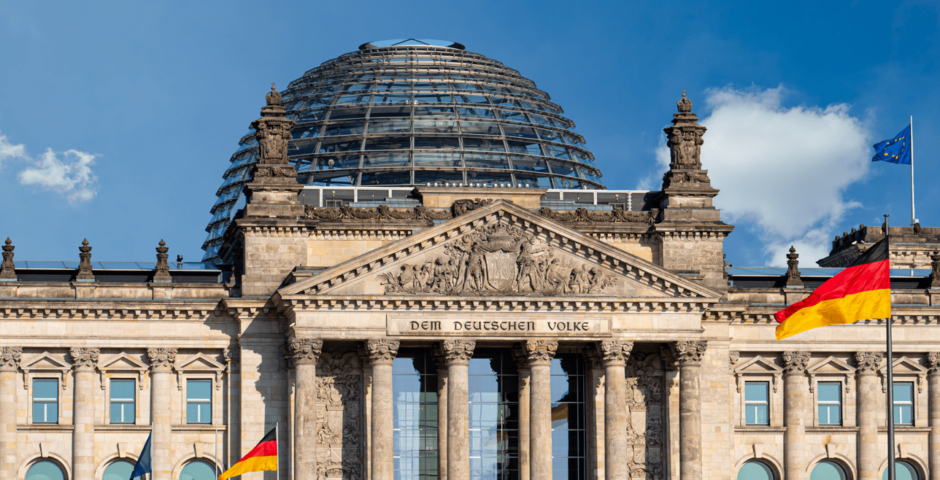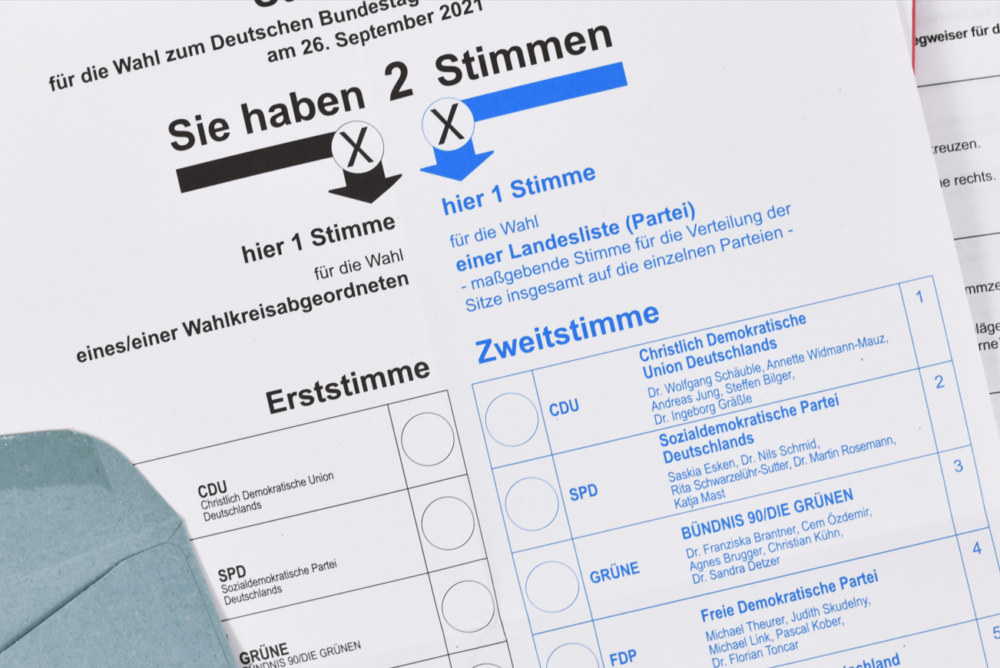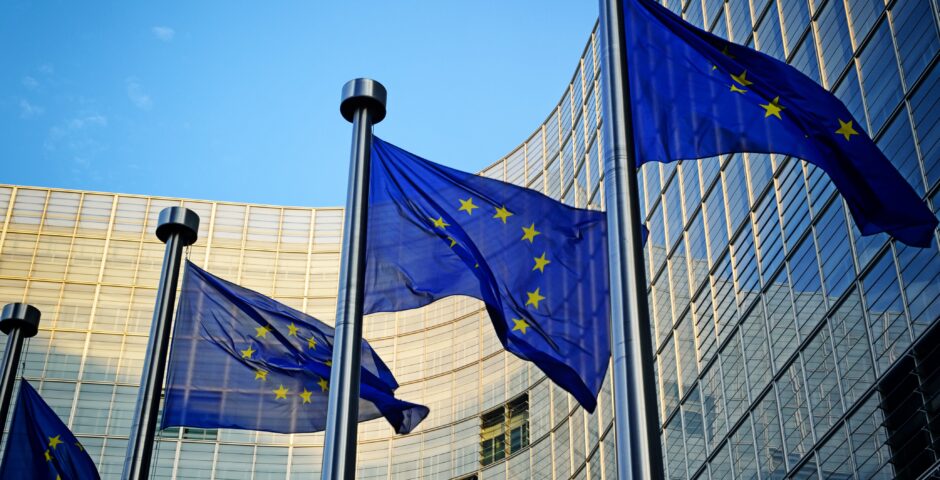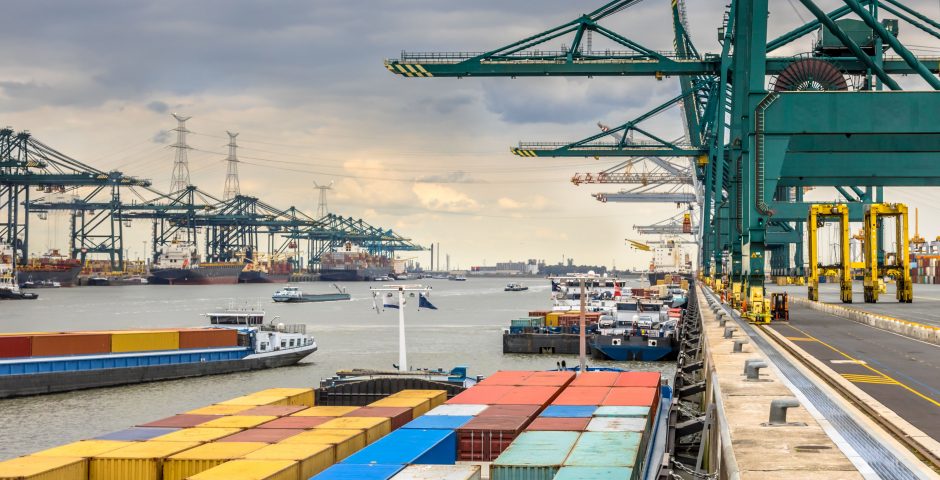Profile of EU member Germany: A divided coalition against extreme right

A country that struggles with the influence of extreme right and where the coalition is regularly divided.
Germany is the European Union (EU) Member State with the highest population and the most seats in the European Parliament (EP). The country is known for large Christmas markets, the Oktoberfest, and famous Germans such as Ludwig van Beethoven, Albert Einstein, and Karl Marx. At the same time, Germany is a country with a turbulent history that still impacts today’s society. Moreover, Germany now faces major political challenges. The country is struggling with the presence of the extreme right and recently also with attacks on politicians.
In the European Union, Germany has always been a strong and reliable ally and a driving force behind European integration. Especially the previous Chancellor Angela Merkel was influential in the EU. Germany seems to be losing this dominant position under current Chancellor Olaf Scholz. This country profile looks at the national political situation in Germany, the country’s history with the EU, and its current position in the EU. It also looks back on previous elections for the European Parliament and looks ahead to the upcoming elections in June.
Geography and demography
In the north, Germany is located on the Baltic and North Seas, and in the south, the country borders Switzerland and Austria. Germany’s other neighbouring countries are Denmark, Poland, the Czech Republic, France, Luxembourg, Belgium, and the Netherlands. Germany has an area of more than 357,000 square kilometres. Since the reunification of Germany in 1990, the country has consisted of sixteen Länder (federal states). These states have a high degree of autonomy and each has its constitution. Three states are ‘city-states’ (both a city and a state): Berlin, Hamburg, and Bremen. The capital of the country is Berlin. Other major cities include Hamburg, Munich, and Cologne.
The population in Germany is between 84 and 85 million. This means Germany has the highest population in the EU. A large number of people with a migration background also live in Germany. During the 2015 migration crisis, Chancellor Angela Merkel spoke the famous words ‘Wir haben so vieles geschafft, wir schaffen das’ (‘We have managed so much, we will manage’), demonstrating Germany’s positive attitude towards refugees. Yet today, migration is a major social and political issue in Germany, as in many other European countries, and the current government is opting for a tougher migration course.
In the twentieth century, after the Second World War, the country was divided into East Germany and West Germany, and even today there are still differences between the former parts, although these differences are becoming increasingly smaller. Every year a report is published on the status of German unity. Economically, the former East Germany lags behind the former West Germany. People in former East Germany are also more sceptical about politics and democracy than in West Germany and are more likely to vote extreme right. For example, in elections in the former East German states of Thuringia and Saxony-Anhalt in 2023, two AfD politicians were elected to local government positions for the first time.
National politics
German politics has a turbulent history. The country was divided into East Germany and West Germany for much of the twentieth century. After World War II, the country was divided into the German Democratic Republic (GDR; East Germany) and the Federal Republic of Germany (FRG; West Germany). There were major differences between the parts: while West Germany developed rapidly economically after the war, the so-called Wirtschaftswunder, East Germany was poor due to the planned economy propagated by the Soviet Union. The Berlin Wall was built in 1961, separating East Berlin and West Berlin. It was not until 9 November 1989, that the Wall fell and East and West were reunited.
The Federal Republic of Germany is now a parliamentary democracy and a federal state. The Federal President is the head of state and has mainly ceremonial duties. Since 2017, this is Frank-Walter Steinmeier. The Chancellor is the head of government, since 2021 Olaf Scholz (SPD). The federal parliament consists of the Bundestag and the Bundesrat. The number of members of the Bundestag is flexible, currently, there are 736. The Bundesrat, the representation of the federal states, consists of 69 members. The states in Germany each have their own government and have many powers.
In principle, there are elections in Germany every four years. The country has a mixed electoral system. There are 299 constituencies in Germany, with an average population of 250,000 people. Not all parties participate in all constituencies. Germany has an electoral threshold of 5%, meaning that a party must win at least 5% of the votes to get a seat in parliament. Currently, there are exceptions for minority parties and parties that win in at least three constituencies. At the next Bundestag elections, new rules will apply to reduce the size of the Bundestag; the latter exception will then be abolished.
German voters cast two votes: the Erststimme and the Zweitstimme. The first vote selects a candidate from the specific constituency. Each party nominates one candidate and then the ‘winner takes all’ system is followed, which means the candidate with the most votes goes to the Bundestag. The German voter casts the second vote for a party via proportional representation. There are closed lists, which means that voters cannot cast a preferential vote. The first vote and second vote both lead to half of the seats in the Bundestag, meaning that it ultimately consists of both local and national representatives.

Ballot in the 2021 Bundestag elections in the federal state of Baden-Württemberg
German political parties
National politics is dominated by the CDU/CSU and the SPD. The centre-right, conservative, Christian-democratic CDU/CSU consists of the Christlich Democratic Union and its sister party from Bavaria, the Christlich-Soziale Union. The Sozialdemokratische Partei Deutschlands (SPD) is a centre-left party. The liberal Freie Demokratische Partei (FDP) also plays an important role in German politics. Even though this party is usually small, it is regularly part of the coalition. The party is a good partner for both the CDU/CSU (because of free markets and lower taxes) and the SPD (because of socially progressive politics). Yet, it is also this liberal party that regularly obstructs by bringing (European) agreements into question again.
There are also newer parties such as Bündnis 90/Die Grünen. This is a centre-left environmental party, which emerged from the association of several social protest movements from the 1980s. In addition, there is Die Linke, a socialist party that emerged from a merger of the PDS (Partei des Demokratischen Sozialismus) and the WASG (Arbeit und soziale Gerechtigkeit – Die Wahlalternative). As in many other European countries, Germany also has a right-wing populist party: the Alternative für Deutschland (AfD). The party was founded in 2013 by economist Bernd Lucke as an anti-euro party. The party has now become a radical right-wing party and there are major concerns about the enormous growth of the party. The court in the state of North Rhine-Westphalia recently confirmed that the German security service may describe the AfD as a ‘possible far-right party’. This allows the security service to wiretap the party and use informants. In addition, there is the party Bündnis Sahra Wagenknecht – Vernunft und Gerechtigkeit (BSW), founded in January 2024, which will participate in the European elections for the first time. BSW is a split from Die Linke, of which Wagenknecht was a prominent politician for a long time. After conflicts within Die Linke, she has now founded a new party together with nine other former Die Linke faction members. The party has both left-wing and right-wing tendencies and can, therefore, appeal to many voters.
Current political situation
The last Bundestag elections were in 2021. Angela Merkel (CDU), who had been Chancellor since 2005, did not stand for re-election. After the elections, a coalition was formed in Germany with the SPD, FDP and Bündnis 90/Die Grünen, with Olaf Scholz (SPD) as Chancellor. This is called the so-called ‘traffic light coalition’ (Ampelkoalition) because of the colours assigned to parties: red for the Social Democratic Party, yellow for the Liberal Party and green for the Green Party. These coalition partners are not natural political partners, which results in regular disagreement within the coalition. The position of the FDP is also under pressure because it is questionable whether it would still exceed the electoral threshold of 5% if there were elections now.
The big issue in German politics and society at the moment has to do with the right-wing populist party AfD. In January, the research platform Correctiv published an article about the AfD’s participation at a meeting in Potsdam. There was a conversation about a ‘master plan’ of mass deportations of people from Germany based on racist criteria, regardless of whether they had a German passport. This led to large protests against the extreme right in the country. The statement ‘nie wieder ist jetzt‘ (never again is now) – which refers to the Second World War and means ‘never again war’ – could be seen on many banners and many politicians participated as well.
Although it has fallen slightly, the party is still high in the polls. Established politicians struggle with how to deal with this party. The discussion emerged to ban the party. The German constitution states that a party can be banned to prevent a fascist party such as the Nationalsozialistische Deutsche Arbeiterpartei (NSDAP) from ever coming to power again. Political parties in Germany can be banned according to the constitution if they undermine the democratic legal order. However, it is questionable what the consequences would be if a party that so many people want to vote for is banned. In addition, it would be counterproductive if the Constitutional Court decides that the party does not need to be banned. Moreover, the voter potential remains in the case of a ban, so a new party will probably emerge to respond to this.
Another issue in national politics has to do with defence. Germany was recently embarrassed by a major wiretapping scandal. While German officers talked about supplying cruise missiles to Ukraine via an online meeting, the Russian secret service listened in unnoticed. It was about the ‘Taurus missile’, which had already caused division in the coalition. Chancellor Scholz wants Germany to not become too involved in the war in Ukraine by supplying this specific type of missile, while the chair of the defence committee Marie-Agnes Strack-Zimmermann (also Spitzenkandidat for the liberals) is advocating the supply of the Taurus missile.
Germany and the European Union
When the ECSC was founded, Germany was divided into the GDR and the FRG. The FRG was one of the founders of the EU. The country has always been important in European integration. After the German reunification in 1990, the GDR and FRG became one country again, which also meant that the former GDR joined the European Community (EC). This was not a usual ‘expansion’ of the EC with a new Member State, as is usually the case through negotiations and treaties. This concerned an expansion of the FRG. Relations in the EC were now slightly different, but not much changed. Only the number of MEPs increased as there were now around 18 million new EU citizens. Germany went from 81 to 99 seats – although this changed again in the subsequent elections and more seats were distributed to other Member States too.
Germany’s previous Chancellor, Angela Merkel, played a key role in the EU. Merkel was Chancellor of Germany from 2005 to 2021 and was important in the EU. Nowadays, this is different; Germany’s role in the EU is changing. While Merkel only had one coalition partner in all four cabinets, Scholz has a more difficult cabinet. The cooperation between the SPD, FDP, and the Greens is not always easy, making decision-making more difficult. This, in turn, has an impact on the EU position. Because the government is regularly divided at the national level, this leads to the blocking of regulations at the EU level. Examples of this are European legislation aimed at responsible entrepreneurship, (Corporate Sustainability Due Diligence Directive) and the ban on fuel cars.
Germans have had many important EU jobs over the years. Historically, prominent Germans have been involved in the European integration process. Konrad Adenauer and Walter Hallstein, among others, are considered pioneers of the EU. The current President of the Commission, Ursula von der Leyen, is from Germany. There are also four Spitzenkandidaten from Germany in these elections. In previous elections, the German Spitzenkandidaten Manfred Weber (EPP) in 2019 and Martin Schulz (S&D) in 2014 played a prominent role. Schulz was also the President of the European Parliament from 2012 to 2017.
Previous European Parliament elections
With 96 seats, Germany has the most seats of all Member States. The turnout rate in the 2019 elections was 61.38%. This was a significant increase compared to the previous elections in 2014, where turnout was only 48.10%. This percentage was also above the EU average of 50.66%.
In European elections, Germans cast only one vote (and not an Erststimme and Zweitstimme as in national elections). Although there is an electoral threshold of 5% at the national level, this is not the case in the European elections. This also makes it easier for small parties to obtain a seat in the EP and there is more political fragmentation at the EU-level than at the national level. There are, therefore, many German parties in the EP; this can also be seen in the table below. The dominant parties at the national level are also the largest in Europe, except for the AfD. It has been five years since the last European elections and at the national level there has been a major change that has resulted in a lot of support for the AfD.
Elections results 2019
| National party | European group | Seats |
| CDU | EPP | 23 |
| Die Grünen | Greens/EFA | 21 |
| SPD | S&D | 16 |
| AfD | ID | 9 |
| CSU | EPP | 6 |
| Die Linke | European Left | 5 |
| FDP | Renew Europe | 5 |
| Freie Wähler (FW) | Renew Europe | 2 |
| Onafhankelijk | NI | 2 |
| Bündnis Deutschland (BD) | ECR | 1 |
| Die PARTEI | NI | 1 |
| Familie | EPP | 1 |
| Onafhankelijk | Greens/EFA | 1 |
| PIRATEN | Greens/EFA | 1 |
| Volt | Greens/EFA | 1 |
| Ökologisch-Demokratische Partei (ÖDP) | Greens/EFA | 1 |
A look ahead to the 2024 elections
The EP elections will take place in Germany on Sunday, 9 June. 96 MEPs will also be elected in these elections. A total of 35 political parties and political associations are participating in the 2024 EP elections. For these elections, the voting age has been lowered from 18 to 16 for the first time (this only applies to the European elections). The voting age has been lowered because of the important challenges that (European) politics now faces, such as the climate, where young people also have an important political voice.
The Eurobarometer six months before the elections showed that Germans believe that the EP should give the highest priority to democracy and the rule of law. Given the recent developments with the AfD, this subject will become an important election issue just before the elections. When asked how likely they are to vote in the European elections in June, 72% said ‘totally likely’. These elections are also the first elections in which the entire country will participate since Scholz came to power. Not only will these elections decide which German politicians will be in the EP for the next five years, but they will also be the first national test for Scholz’s government.
The campaign is now in full swing. Social media are also used, including TikTok. The AfD in particular is doing well on the social media platform, where they are mainly successful among young people who receive the extreme right message on their screens through the algorithm. TikTok has limited the influence of AfD party leader Maximilian Krah due to spreading conspiracy theories. His videos will no longer be recommended to TikTok users until after the election. Krah has been in the EP since 2019 and has already been suspended several times by his I&D faction. He is also accused of receiving payments from Russia and China. The German Public Prosecution Service has launched two preliminary investigations into Krah’s ties with Russia and China. In addition, an employee of Krah was recently arrested for spying for China. Two weeks before the elections, it was announced that Krah was no longer allowed to campaign for his party due to controversial statements about the SS. A day later, the I&D faction decided to expel the AfD from the faction because of these statements by Krah.
Germany has several political heavyweights as party leaders in these elections, both for the national parties and for the (largest) European groups (Spitzenkandidaten), and with this Germany profiles itself in European politics. Ursula von der Leyen is the lead candidate of the EPP, Terry Reintke of the Greens, and Marie-Agnes Strack-Zimmermann of ALDE. Also, lead candidates from other parties are prominent politicians in the EU, such as Manfred Weber (party leader of the EPP) for the CSU and Katarina Barley (one of the vice presidents of the EP) for the SPD.
The EP candidates will have to win votes at the national level, but it is a difficult time for German politicians. The number of (physical) attacks on politicians has increased considerably in recent years. Several politicians have also been attacked in recent weeks. MEP Matthias Ecke (SPD) was seriously injured when he was attacked while putting up EP election posters. A few days later, former mayor of Berlin Franziska Giffey (SPD) was attacked, and a few hours later politician Yvonne Mosler (die Grünen). Several AfD politicians were attacked as well.
It will be an important election in Germany, politics is on edge and there are tensions in the country. Nevertheless, the campaigns are of course already in full swing. No national debates have yet been held. These will take place shortly before the elections, on 30 May and 6 June. Politicians also try to be more visible on social media. Politicians from ‘older’ parties can now also be found on TikTok to reach the young audience. Even the Chancellor can now be found on TikTok. In short, the country is in the final campaign sprint to the EP elections.
Hanna Krijgsman van Spangenberg holds a master’s degree in Political Science from Vrije Universiteit Amsterdam and a bachelor’s degree in European Studies from the University of Amsterdam with a major in European history.
Images: Shutterstock




